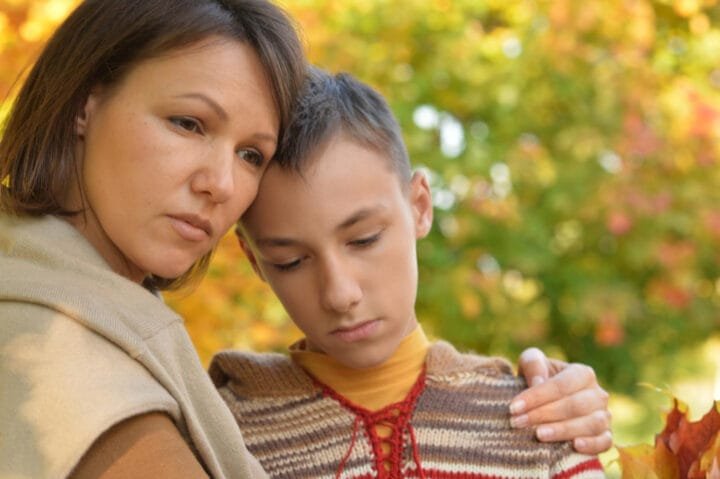Why Won’t They Apologize? Unpacking the Roots of Apology Resistance in Adult Children
Have you ever found yourself in a relentless battle with your child? Not a light-hearted one, but a draining, emotionally charged conflict where the rope is an apology, and the prize is a semblance of peace? You’re not alone. What if your son is already an adult, entrenched in apology resistance patterns, and the phrase ‘my adult son refuses to say I’m sorry’ has become a painful mantra in your mind?.
Many parents share the unbearable reality of their adult children’s refusal to apologize, even when they should. We can feel hurt, confused, and even contemplate giving up on our parenting journey when faced with such defiance. Let us dissect this intricate problem and learn techniques to navigate such turbulent circumstances quickly and sensibly.
The “I’m Sorry” Standoff: When Apologies Become a Battleground
Imagine this: An altercation occurs between you and your grown-up son. He disrespects you, violates your limits, or offends a person dear to you. After an exchange of harsh words, he leaves in a huff. All that is wished for is just a couple of words, an expression of sorrow, a promise that the pain inflicted will not be repeated. Yet, there is almost nothing. The words are round; the silence is unbearable. This situation is, unfortunately, the usual situation for many parents.
Apology resistance in adult children can strain relationships, erode trust, and create a chasm between parents and their offspring. However, there is hope. If we discover the root causes of this resistance, we can bridge the divide and promote better communication styles. We can leave behind the wait where each other says, ‘I am sorry,’ and come to a conclusion that brings about reconciliation. There is a path to improvement, and it’s within reach.
The Building Blocks of Apology: Understanding the “Why” Behind Resistance
Why do some parents’ adult children forget or avoid saying the two easily pronounceable words? The answer, as one might expect, is not simple. The reasons range broadly: emotional, formative, or intersectional during and across generations. Let’s expand further on these aspects.
Emotional Barriers: Pride, Shame, and Fear of Vulnerability
Reflect on a situation in your life where you felt uncomfortable saying sorry. It could be that your ego did not allow you to acknowledge accountability. That embarrassment could even overtake you, leaving you defenseless and vulnerable. These sentiments inhibit our clients’ adult children from extending a proper apology.
- Pride: For some, admitting fault feels like a defeat, a chink in their carefully constructed self-sufficiency armor. They may perceive an apology as a sign of weakness rather than an act of strength and accountability. Psychologist Dr. Harriet Lerner, author of The Dance of Anger, explains, “Pride often masquerades as self-protection. It whispers that admitting fault will diminish us in others’ eyes.”
- Shame: Shame can often be the biggest obstacle to accepting apologies. It tells us we are not perfect or worthless and should be punished. This feeling is so pervasive that it becomes challenging to take responsibility for behaviors, let alone seek forgiveness. Brené Brown, a leading researcher on shame and vulnerability, states, “Shame corrodes the very part of us that believes we can change.”
- Fear of Vulnerability: An apology makes one vulnerable because it entails lowering the walls, revealing their weaknesses, and accepting that one can make mistakes. This difficulty may be for someone who has been hurt or undergone rejection or betrayal. Such behavior would imply that it would be better not to seek an apology from them. This would only lead to more potential hurt or ridicule.
Developmental Influences: How Childhood Shapes Apology Patterns
The foundation for apology resistance is often laid in childhood. How we were raised, the family dynamics we experienced, and the messages we internalized all contribute to our understanding and expression of apology.
- Early Childhood Experiences: Did your son grow up in an environment where mistakes were met with harsh criticism, punishment, or ridicule? If so, he may associate apologies with negative consequences, leading him to avoid them at all costs. On the other hand, if the child rarely remembers his parents telling him sorry, he may lack these crucial role models who can perform this action with him. This is further discussed in detail by Dr. Gordon Neufeld, an expert in child development. He claims parents are crucial role models in a child’s social and emotional spheres. He says, “Kids learn more from what we do than from what we say.”
- Attachment Styles: Early attachment relationships with caregivers significantly influence our emotional development and interpersonal patterns. Children who develop secure attachments are more likely to have emotional security and the confidence to admit mistakes and apologize. However, those with insecure attachment styles, such as anxious or avoidant attachments, may struggle with vulnerability and emotional expression. This makes apologizing more challenging.
- Temperament: Some individuals apologize naturally. Those with a strong sense of responsibility and empathy may find it easier to express remorse. Yet, some of these people may be independent-minded or entirely reserved or find it difficult to perceive the repercussions of their deeds on others. As such, they may remain unable to express their emotions, even when, at heart, they feel remorse for their behavior in a particular instance.

Breaking the Cycle: Practical Strategies for Parents
Are you overwhelmed? Don’t despair! Even if your adult son’s resistance to apology seems deeply ingrained, there are steps you can take to foster healthier communication patterns. These steps will encourage him to take responsibility for his actions.
Fostering Empathy and Accountability in Early Childhood: Prevention is Key!
By instilling these values in our children, we can prevent the development of apology resistance. This is a powerful strategy that can make a significant difference in our children’s future communication and relationship patterns.
Apology resistance can best be solved by preventing it from growing in the first place. For example, parents should raise their kids in the early years so that empathy and accountability are instilled in them, which will help in the development of good relationships and good communication. This can be achieved by promoting the idea of ‘thinking of other people’ to children, instilling the spirit of accountability in children, and modelling such behaviors in the parents’ relationships.
- The Model of Sincere Apologies: Kids are fascinated by everything around them, reaching comprehension as they grow. It is a universal phenomenon that affects children. When we make mistakes, we should admit them and sincerely apologize to our child or whoever else is unfortunate enough to be around. An apology is not a sign of defeat but a valuable tool to win trust and mend an essential bond. What would a parent say when his children knock over their juice cup? ‘I should not have left it there. Let us clean it together,’ rather than, ‘Don’t do that, come here!’ These accounts set up a foundation of maturity with kids witnessing responsibility and compassion first-hand.
- Create a Safe Space for Mistakes: Let’s cultivate a growth mindset in our homes, where mistakes are viewed as opportunities for learning and growth, not personal failures. When children feel safe admitting their errors without fear of judgment or harsh consequences, they are more likely to develop a sense of accountability. Dr. Carol Dweck, a renowned psychologist and author of Mindset: The New Psychology of Success, emphasizes praising effort and resilience rather than focusing solely on outcomes.
- Teach Emotional Literacy: Assist your children in recognizing and articulating feelings such as guilt, shame, or compassion. By nurturing the emotional aspect, they will understand social interactions better, develop friendships, and learn about themselves and others. One may do so by reading story books that portray emotions, engaging in playful activities that evoke emotions, or simply talking about feelings.
Addressing Apology Resistance in Adulthood: Navigating the Challenges
What if your son is already an adult, entrenched in apology resistance patterns, and the phrase “my adult son refuses to say I’m sorry” has become a painful mantra in your mind? Don’t lose hope! While it may require more patience, persistence, and self-compassion, it’s never too late to encourage positive change.
- Open and Honest Communication: Initiate calm, non-confrontational conversations about the issue. Focus on understanding his perspective and the underlying reasons for his resistance. Avoid accusatory language or ultimatums, which can trigger defensiveness and escalate conflict. Instead, use “I” statements to express your feelings and needs. For example, instead of saying, “You always make me feel disrespected,” try saying, “I feel hurt and disrespected when you speak to me that way.”
- Setting Healthy Boundaries: Identifying appropriate and disproportionate responses to disrespectful conduct, such as failing to apologize, is necessary. Such measures may include reducing contact, declining requests to meet or get out, or blaming someone gently but candidly. Remember, setting boundaries is not about punishment but protecting your well-being and demonstrating that your actions have consequences. Dr. Henry Cloud and Dr. John Townsend, authors of Boundaries, explain, “Boundaries define us.” They define what is me and what is not me. A boundary shows me where I end, and someone else begins, leading me to a sense of ownership.”
- Seeking Professional Guidance: When the situation escalates to a point where you feel the phrase ‘my adult son refuses to say I’m sorry’ echoes your daily struggle, seeking professional guidance can be beneficial. Family therapy or counseling tries to define the underlying issues of the family while improving how members interact with each other. An emotional and professional family therapist is supposed to mediate disagreements so that you and your son can communicate better with one another.

Beyond the Words: Finding Alternative Paths to Reconciliation
Sometimes, despite our best efforts, the coveted “I’m sorry” remains elusive. But does that mean all hope is lost? Not! We can shift our focus from demanding a specific phrase to seeking alternative forms of acknowledgment and repair.
Shifting the Focus from “I’m Sorry” to Acknowledging and Repair
- Encourage Acknowledgment of Harm: Apologizing is not always necessary, and sometimes, acknowledging the effect of wrongdoing is more vindicating. Ask your son to elaborate on his actions and how they affected you or the other parties. These expresses regret and readiness to accept responsibility even without explicit “I am sorry” words. For instance, he may state, “I understand that what I said must have hurt you, and I am sorry for doing that.” This shows that the individual accepts the damage; he understands what he has done, even if he cannot provide a complete apology.
- Focus on Actions that Demonstrate Remorse: As the adage says, ‘talk is cheap,’ and it is an action that the son should be encouraged to take to seek forgiveness. In this respect, it may entail positioning oneself to compensate for what occurred. It may also involve expressing a desire to help or showing a willingness not to repeat such behaviors in the future. For instance, if he smashed something during an altercation, he can replace or fix it. Where he or someone else offended someone’s feelings, they should not repeat the same action.
Prioritizing Understanding and Forgiveness: The Path to Healing
- Practice Active Listening: It is necessary to listen to your son and appreciate his side of the story even when no apologies are made. This assures him that you consider his emotions and seek a solution. One form of listening is comprehension. This consists of looking for all types of words and motions, comprehending points made by others, asking questions, and incorporating what one has already learned. If you speak out, remain silent, pass judgment, and tell the recipient what to do and what not to do. Concentrate more on ensuring he can speak out without fear of judgment.
- Cultivate forgiveness: A gift given and received at the same time. Rather than letting go of what has been done to us, it means feeling no longer angry or resentful about the past. Forgiveness helps one advance in life with calmness and insight, regardless of whether an apology is offered. However, one should note that forgiveness is a journey, not a goal. The journey includes self-forgiveness, time, and acceptance of the past.
When “My Adult Son Refuses to Say I’m Sorry” Masks Deeper Issues
Sometimes, apology resistance is a symptom of deeper underlying issues that require further exploration and intervention.
- Mental Health Challenges: If your son continues to exhibit a persistent pattern of not wanting to say sorry, it may be helpful to explore the possibility of any mental health issues impacting this behavior. Depression, personality disorders, anxiety, and trauma can hinder one’s ability to effectively take responsibility for, manage emotions, and show empathy toward others. If you think your son might suffer from such a condition, suggest consulting a therapist for appropriate help.
- Substance Abuse: Substance abuse might also affect thinking clearly and controlling emotions, as well as interpersonal conflicts. As a parent, it is imperative to resolve this issue as soon as possible if your son is struggling with substance abuse. Support groups, therapy, and rehabilitation centers can be invaluable tools during healing.
- Unresolved Trauma or Past Hurts: Sometimes, the heartbreaking reality of ‘my adult son refuses to say I’m sorry’ may stem from more profound unresolved trauma or past hurts. In such cases, it is possible to understand their reluctance to use an apology, which is often extended courtesy – they do not wish to suffer again. In such situations, the importance of mentioning speech therapy is essential because it also teaches patients how to handle their previous trauma differently and effectively.

The Power of Self-Reflection: A Journey of Growth and Understanding
While it’s easy to focus solely on our son’s behavior, examining our role in the dynamic is equally essential. Self-reflection can be a powerful tool for growth and understanding.
- Examine Your Apology Patterns: How many times do you say sorry? When you say sorry, are you genuine or just playing along? How often do you model accountability and take responsibility for your actions? Children learn by imitating adults, so we must study our apology strategies and improve them where necessary.
- Consider Your Communication Style: Do you have an open and accepting way of communicating with your son, or are you often critical, judgmental, or too controlling? Do you allow him a space to be himself without being judged? Considering these questions regarding our communication style can highlight what we can do better. It can also highlight how to build a more positive and encouraging atmosphere in our family.
- Seek Support and Guidance: Dealing with adult children’s issues can be overwhelming and isolating. Do not hesitate to contact friends, relatives, psychotherapists, or community support groups. It is comforting, uplifting, and wise to find one’s voice amidst those who have been through similar challenges.
Recommended Reading
Navigating the complexities of family relationships and seeking reconciliation can be challenging. Here are some books that offer valuable insights and guidance:
On Apology and Forgiveness:
- The Five Languages of Apology by Gary Chapman and Jennifer Thomas: Discover the different ways people express and receive apologies, and learn how to effectively apologize and seek forgiveness in your relationships.
- Why Won’t You Apologize?: Healing Big Betrayals and Everyday Hurts by Harriet Lerner: Explore the psychology behind apology resistance and gain practical tools for healing from betrayals and navigating difficult conversations.
- Forgiving What You Can’t Forget: Discover How to Move On, Make Peace with Painful Memories, and Create a Life That’s Beautiful Again by Lysa TerKeurst: A guide to understanding and practicing forgiveness, even when faced with deep hurt and painful memories.
On Setting Boundaries:
- Boundaries: When to Say Yes, How to Say No To Take Control of Your Life by Henry Cloud and John Townsend: Learn how to establish healthy boundaries in your relationships, protect your well-being, and communicate your needs effectively.
- Set Boundaries, Find Peace: A Guide to Reclaiming Yourself by Nedra Glover Tawwab: A practical and empowering guide to setting boundaries, reducing stress, and creating healthier relationships.
On Improving Communication:
- Nonviolent Communication: A Language of Life by Marshall B. Rosenberg: Master the art of compassionate communication, resolve conflict peacefully, and deepen your connection with others.
- Crucial Conversations: Tools for Talking When Stakes Are High by Kerry Patterson, Joseph Grenny, Ron McMillan, and Al Switzler: Develop the skills to navigate challenging conversations effectively, express yourself honestly, and achieve positive outcomes.
Conclusion: Moving Forward with Hope and Healthy Relationships
It is reasonable to assume that some parents experience frustration and grief when their grown children refuse to apologize even if their actions warrant an apology; such moments sometimes lead to despair or uncertainty. But you must remember that it is not just you who struggles! Many parents have similar experiences. Comprehending the reasons associated with the reluctance to make apologies, their practical application, placing empathy, understanding, and forgiveness above all, and willingness to examine one’s role in the family dynamic can help resolve unhealthy communication and strengthen ties with our adult children.
Do not forget that parenting is a marathon, not a sprint. You will have love, joy, pride, meaningful connections, frustration, disappointment, and even suffering. Realize the struggle, enjoy the success, and most of all, nurture the dream of having better relations with your children than you currently do; that is achievable.
Well, it’s your turn! Tell us about your experiences, perceptions, and questions in the comments. Let’s understand where we can benefit from each other’s experiences and struggles as we seek to understand parent-child relationships.
FAQs
It’s natural to yearn for an apology from your son. You can use an apology to validate your feelings, acknowledge the pain caused, and demonstrate your willingness to accept responsibility. Apologies can be a crucial step towards healing and reestablishing your connection. You should remember, however, that focusing exclusively on those two words can sometimes make the process harder.
Despite the consistent effort and open communication, some individuals struggle to apologize directly. Although this can be highly frustrating, healing and reconciliation can still occur. Encourage your son to show genuine remorse through changes in his behavior and slowly rebuild trust.
While an apology can facilitate forgiveness, it is not essential. It is a deeply personal choice and a process, not a single action. Forgiveness doesn’t excuse hurtful behavior but allows you to release anger and resentment. You can still hear from your son without an apology.
You may need to encourage your son to seek professional support if he has difficulty apologizing because of underlying mental health conditions like depression, anxiety, or personality disorders. In addition to identifying the underlying issues, a therapist can provide appropriate guidance and treatment.
Living with a son with an obstinate attitude and failure to recognize his fault is quite demoralizing. Establish healthy limits and attend to your emotional needs in these testing times. You should speak to your friends, family or therapist about this. Do things that add value and happiness to your life.
Related Posts















































































